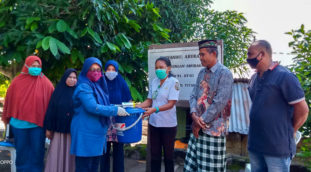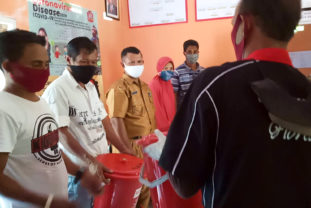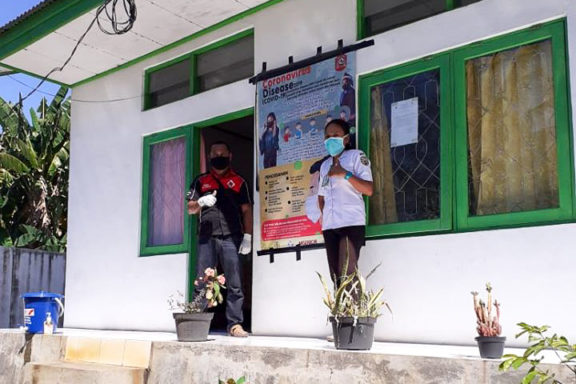This post is also available in:
 Indonesian
Indonesian
It was early in the morning when Ain shared her story. On my screen, I could see the smiles and warm greetings of friendly faces from all over Indonesia, from Sumatra in the west to Maluku in the east.
“We started by monitoring the COVID-19 impact on communities and found out that they really needed immediate assistance in finding markets for their products,” said Ain (Nur Ain Lapolo) Director of Japesda organisation in Gorontalo, Central Sulawesi, as she spoke to more than 30 people from 13 different organisations gathering on a Google Meet call.
The session was the first meeting as part of the newly initiated ‘Kumpul Mitra’ (partner gathering), an online sharing and learning forum where Blue Ventures partners in Indonesia share knowledge and discuss issues impacting their work supporting community based marine conservation efforts.
For the past two months, Kumpul Mitra has become the only way for us to connect with each other. Although we all come from different islands, it doesn’t feel so far when I hear Ain’s voice loud and clear through my headphones… Well, sometimes not completely crystal clear when the connection is interrupted!
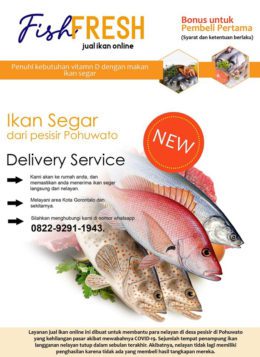
Ain’s FishFresh poster created by Japesda
“We created this online marketplace called ‘FishFresh’ for seafood products from Torosiaje fisher communities in Popayato Sub-district, and also ‘Ramba-ramba Online’ [meaning herbs and spices] to sell farming products from the farmer communities that we support,” Ain said humbly, despite the monumental work that she was describing.
That day, I was moderating a Kumpul Mitra session that focused on the topic ‘Fishers facing COVID-19 crisis’. Ain was sharing a great initiative on how Japesda has been supporting communities in this difficult time. She showed us some engaging posters of both of the new online marketplaces, completed with Japesda contact for customers to order online through WhatsApp.
“Through the Economic Development Division, Japesda will continue to develop this business scheme by looking at market opportunities and cooperating with several potential partners to help market the products of fishermen and farmers,” Ain added.
In Indonesia, COVID-19 has affected the purchasing power of fishers’ due to the fisheries supply chain being cut off.In Indonesia, COVID-19 has affected the purchasing power of fishers’ due to the fisheries supply chain being cut off. For example, as a result of the restrictions on global trade, companies are no longer able to export octopus to their destination countries meaning that octopus prices in Indonesia have dropped. Now, octopus is caught solely for domestic consumption and only sold at local markets where there are fewer customers than usual.
Since the COVID-19 crisis, there’s also been no price difference for size categories in octopus fisheries, whereas before, larger octopus had a higher price per kilogram.
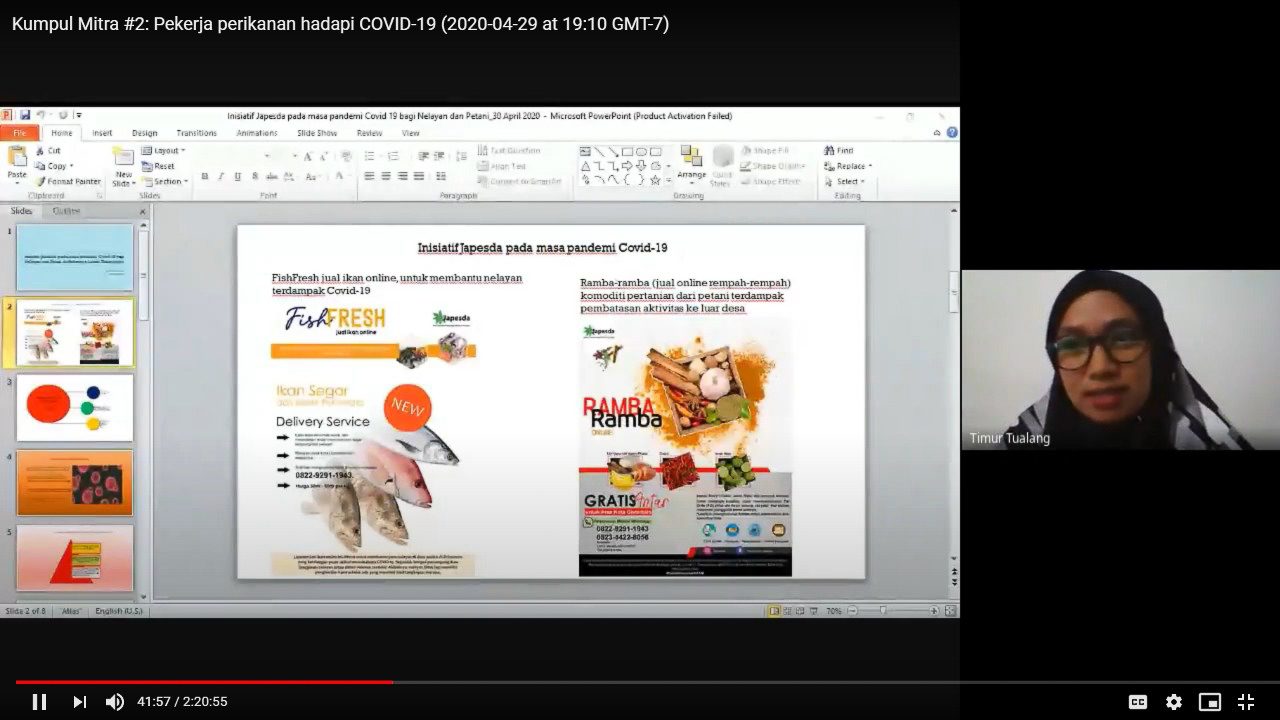
Ain presenting FishFresh during Kumpul Mitra | Photo: Nisa Syahidah
But, through FishFresh, Japesda has found a way for fishers who catch fish and octopus in an eco-friendly way to still earn an income. Fish sold are caught using fish hooks, not using poison or bombs, or another destructive way.
They can now sell their catches to middle class buyers in Gorontalo city who are willing to pay more for eco-friendly products, and the same goes for the farmer communities that Japesda supports who practice organic farming.
Coastal communities need support
In eastern Indonesia, the octopus fishers in Arubara and Mourongga in the coastal Ende Regency, East Nusa Tenggara have also seen a decrease in price over the past two months.
In order to support these communities, the Tananua Flores Foundation team, working with MISEREOR organisation and the local government, have provided food supplies and education of COVID-19 prevention, as well as protective gear for health workers, including facemasks and hand washing equipment.
In total, the Tananua team has managed to distribute 10 tonnes of rice, more than 500 hand washing stations, 2,500 reusable masks, and 1,000 hand sanitiser units.
Working with communities is not just about the progress we make during the good times, it’s also about showing our support during the most challenging times too,” said Hironimus Pala, Director of Tananua.
During that particular Kumpul Mitra, Benjamin Gosa, Tananua’s Head of Community Development, showed me some amazing educational posters they had created in the local language. He told me, “We are very happy to be able to support the local people. The coastal communities are having the hardest time and they need more assistance and education on how to prevent the spread of COVID-19”.
Creating solutions, together
The COVID-19 pandemic has had a significant impact on the coastal communities at each of Blue Ventures partner sites in Indonesia. Most fishers now have little to no income, but prices of basic food like rice and sugar are going up. In addition to that, there is also growing fear around misinformation about COVID-19.
The social impacts and lack of food have become the most urgent issues that need to be addressed by organisations in the field. Their ability to remain agile, adaptive and responsive means that despite the challenges, our partners have been able to create effective solutions to these problems.
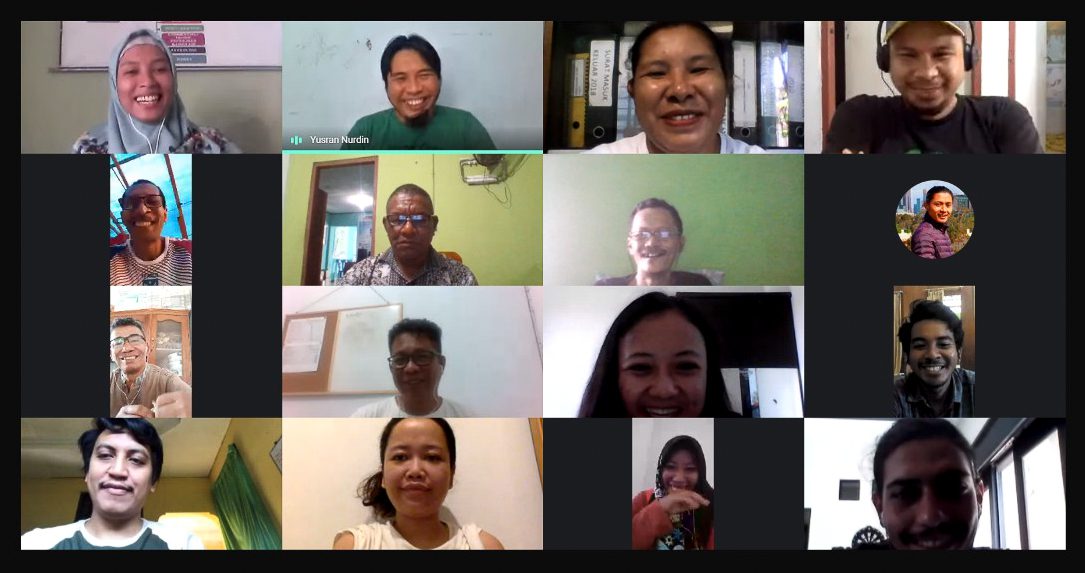
Kumpul Mitra on Google Meet | Photo: Nisa Syahidah
Some teams have even suggested reviving traditional bartering systems, for example trading rice for fish.During our Kumpul Mitra discussions, some great ideas have come up about how organisations can support fishers, such as developing local supply chains using new technologies, creating community food barns and offering COVID-19 relief that responds to local needs. Some teams have even suggested reviving traditional bartering systems, for example trading rice for fish.
The pandemic has also meant that many partners are exploring how to increase communities’ social security in the long-term, including diversifying the livelihoods of fishers, initiating household financial management programmes, taking a gender perspective approach to respond to the impacts of COVID-19, and strengthening health care systems in remote areas and hard-to-reach islands.
Despite working in different contexts and provinces, and with different approaches, our network of conservation organisations in Indonesia all share the same vision; to drive community-led conservation by strengthening and uniting local partner organisations. This shared vision is what keeps us going, even during the hard times.
Whilst moderating Kumpul Mitra discussions, I’ve been really inspired by the work that our partners are doing to tackle the crisis. Although the COVID-19 pandemic remains a threat throughout Indonesia and around the world, I feel hopeful for the future. The challenges of the crisis have forced us all to think differently, to adapt to new situations and to find new ways of working collaboratively, in spite of physical distance.
And until we can meet in person again, we just meet in Meet.


